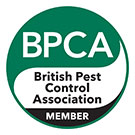GOT PEST PROBLEMS, GET IN TOUCH FOR A FREE QUOTE
- Telephone0141 432 0433
- Emailinfo@allpestservices.co.uk
- REQUEST A CALLBACK
The principal species of Bee that sometimes cause problems in the UK are the Honey Bee, Bumble Bee and Masonry Bee although there are actually thousands of different species. The Honey Bee is a beneficial insect of great importance in pollination.
Numbers have plummeted in recent decades so control measures should only be employed as a last resort in exceptional circumstances. They are not normally considered pests and generally sting only when severely provoked (Honey Bees die when stinging a large animal such as a human). They are social insects.
The Bumble Bee, like the Honey Bee, is also an important pollinator of plants. It is also very docile and will only sting if severely provoked. Generally nests are best left alone.
The Masonry Bee is not a social insect like the Honey Bee but the insects commonly group together on the sunny side of rocky outcrops and walls. Their presence can cause distress but primarily their pest status is derived from their propensity to burrow in to soft mortar. Eggs are laid inside holes burrowed in to the stonework which is filled with pollen and nectar. The larvae feeds on this until pupation, over-wintering prior to emerging as a fully developed adult bee in the Spring.
2021 UPDATE – PLEASE NOTE THAT WE ARE UNABLE TO CARRY OUT LETHAL TREATMENT FOR BEES
Do you have a problem with bees? We can help…
All Pest Services is a member of the British Pest Control Association (BPCA) and the National Pest Technician’s Association (NPTA), as well as being an approved member of the Confederation of European Pest Control Associations (CEPA). We are also Safe Contractor Approved.
Our staff have been specifically trained to undertake all types of insect control work and have many years’ experience in the profession. All our staff have achieved the Royal Society for Public Health Level 2 Award in Pest Management which is a requirement for members of the BPCA. All our staff also have specific qualifications in Insect Control and the Safe Use of Pesticides.
Although many pest species can be relatively easily controlled the key is correct identification. Incorrect identification of the pest species or extent of infestation are the most common reasons for failure. For this reason All Pest Services offer a bespoke service for most types of insect control. The first thing is to give us a call to discuss the problem. Some issues can be resolved without the need for treatment. Alternatively we can carry out a site survey to ensure the problem is correctly identified and efficiently dealt with.
All Pest Services is a member of the British Pest Control Association (BPCA) and the National Pest Technician’s Association (NPTA), as well as being an approved member of the Confederation of European Pest Control Associations (CEPA). We are also Safe Contractor Approved.
Our staff have been specifically trained to undertake all types of insect control work and have many years’ experience in the profession. All our staff have achieved the Royal Society for Public Health Level 2 Award in Pest Management which is a requirement for members of the BPCA. All our staff also have specific qualifications in Insect Control and the Safe Use of Pesticides.
Although many pest species can be relatively easily controlled the key is correct identification. Incorrect identification of the pest species or extent of infestation are the most common reasons for failure. For this reason All Pest Services offer a bespoke service for most types of insect control. The first thing is to give us a call to discuss the problem. Some issues can be resolved without the need for treatment. Alternatively we can carry out a site survey to ensure the problem is correctly identified and efficiently dealt with.
Although most insects do not cause us problems and many are benign or even beneficial even in our homes there are other insects that can cause problems. These may need controlling for reasons such as preventing the spread of disease, preventing damage to livestock and crops or property, preserving public health or public or safety. Some insects can bite or sting (such as Fleas, Bed Bugs or wasps) while others spread disease such as cockroaches which can spread diseases such as Staphylococcus spp., E Coli, Shigella spp., Salmonella spp. Other insects are significant because of their role in damaging or contaminating foodstuffs, such as Grain Weevil, Flour Beetle, Grain and Flour Moths etc.
Causing harm to any species, whether insect or otherwise, is a last resort. Some species, such as flies and night moths can be effectively controlled using Fly Screen Doors and Windows or the installation of Electric Fly Control Units. Others can be effectively managed by removing their food source. In many cases however a pesticide will be needed. All Pest Services can advise on the installation of Fly Screens and Fly Control Units as well as the safest and most appropriate pesticides where necessary.
This is a complex area and is governed by a wide range of legislation including the Food and Environment Protection Act 1985 Part 3 [FEPA], the Control of Pesticide Regulations 1986 [COPR], the Wildlife and Countryside Act 1981, the Control of Substances Hazardous to Health Regulations [COSHH], amongst others. If you’re unsure seek advice from a reputable pest control company like All Pest Services. Certain species such as honey bees, while not specifically protected, are becoming increasingly endangered and should not be destroyed apart from in extreme situations. In many cases a bee keeper will be able to remove them without causing any harm if it is absolutely necessary. Specific measures must be followed if control measures are required – please seek advice before you act!
GOT PEST PROBLEMS, GET IN TOUCH FOR A FREE QUOTE










